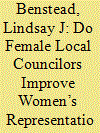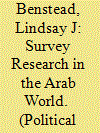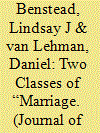| Srl | Item |
| 1 |
ID:
168847


|
|
|
|
|
| Summary/Abstract |
Tunisia’s 2018 municipal elections, in which a legislated quota was implemented and women won 47 percent of seats, raises questions about whether electing female councilors improves women’s representation in clientelistic settings. Using data from the Local Governance Performance Index (LGPI), an original survey of 3,600 Tunisians conducted in 2015 by the Program on Governance and Local Development (GLD), this article investigates the relationship between local councilors’ gender and women’s access to help with personal or community issues. Three findings emerge. First, male citizens are thirteen percentage points more likely than female citizens to know a local councilor and six percentage points more likely to have contacted a councilor for help. This offers evidence of greater network homosociality for club goods than personal requests. Second, citizens of both genders are twice as likely to contact a councilor of the same gender when asking for help with community problems. Finally, electing females increases women’s access to councilors, due to network homosociality—that is, denser personal networks with others of the same gender—but has a limited impact on men’s access because female councilors have more heterosocial networks. By showing that electing and appointing women improves service and allocation responsiveness to females, the results call attention to the need to address gender equity issues when drafting electoral laws and implementing decentralization laws.
|
|
|
|
|
|
|
|
|
|
|
|
|
|
|
|
| 2 |
ID:
160323


|
|
|
|
|
| Summary/Abstract |
Survey research has expanded in the Arab world since the 1980s. The Arab Spring marked a watershed when surveying became possible in Tunisia and Libya, and researchers added additional questions needed to answer theoretical and policy questions. Almost every Arab country now is included in the Arab Barometer or World Values Survey. Yet, some scholars express the view that the Arab survey context is more challenging than that of other regions or that respondents will not answer honestly, due to authoritarianism. I argue that this position reflects biases that assume “Arab exceptionalism” more than fair and objective assessments of data quality. Based on cross-national data analysis, I found evidence of systematically missing data in all regions and political regimes globally. These challenges and the increasing openness of some Arab countries to survey research should spur studies on the data-collection process in the Middle East and beyond.
|
|
|
|
|
|
|
|
|
|
|
|
|
|
|
|
| 3 |
ID:
182865


|
|
|
|
|
| Summary/Abstract |
Some Somali majority clan girls and women receive economic and security benefits from marriage to Al-Shabaab fighters. Yet, the literature treats women’s experiences monolithically and misses the role that race plays in determining the circumstances of such unions. The authors argue that one should not refer to the unions of Somali Bantu girls and women with Al-Shabaab fighters as a “marriage” but rather as sexual and domestic slavery – a form of extraction by Al-Shabaab that works to ethnically cleanse the Bantu from their ancestral land. Drawing on data from an original survey conducted in 2017 of 139 Somali Bantu refugee households who fled to Kenya during the previous year, the authors examine the nature and extent of unions between females from different races with Al-Shabaab fighters. Women and girls from majority clans are more likely to marry fighters freely. Compared to majority clan females, Somali Bantu girls are enslaved by Al-Shabaab fighters at younger ages and typically remain with their own families rather than moving to the man’s household, contrary to Somali’s patrilineal marriage customs. Al-Shabaab fighters do not claim the children they have with Somali Bantu girls and women, whom they despise as a racially distinct minority with low social status. This work underscores the need to avoid the term “marriage” when referring to the sexual slavery of minorities in Somalia by Al-Shabaab and for the international community both to investigate claims of ethnic cleansing as well as support the fledgling Somali government in establishing a system of rule of law.
|
|
|
|
|
|
|
|
|
|
|
|
|
|
|
|